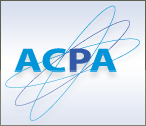
Certification Service
Course and institution certification
| Course certification | Certifies the quality and effectiveness of each courseExperts in the related field examine various elements of the course (course materials, curricula, drills and practices, tests, etc.) based on the criteria established by the ACPA, and clarify to what extent trainees can acquire the skills defined by the ACPA as necessary on the course. If the results are satisfactory, the ACPA certifies the course as having the standard quality and effectiveness. |
|---|
| Institution certification | Certifies the standard quality of educational institutionsThere are two types of institution certification: certification for course-providing institutions and certification for course-executing institutions. The former is awarded when the institution is recognized as capable of continuously providing an ACPA-certified course, while for the latter, the institution needs to prove itself capable of cooperating with the ACPA in the certification of practical abilities of individuals. |
|---|
ACPA registration marks

ACPA registration marks
When a course or an institution is certified, the institution is allowed to display the ACPA registration marks on its syllabus, course catalog, website, etc.
Certification procedures
The certification is granted after each course or institution has been assessed as explained below.
1. Course certification
Each course is assessed according to the ACPA standard skill matrix (a table showing which skills are required for each occupational category and experience level). The ACPA uses the matrix to check which occupational category and experience level the course belongs to, as well as what skills should be acquired, and assesses the course in terms particularly of the items defined below. The course is rechecked every three years to maintain its quality, and the certification is renewed.
Assessment items
| (1) Content : | Are the details, goals and objectives of the course appropriate? |
|---|---|
| (2) Evaluation of trainees : | Is the achievement level of each trainee appropriately evaluated? |
| (3) Completion conditions : | Are the course completion standards and/or tests appropriate? |
| (4) Curriculum : | Is the curriculum appropriate without being too tight? Does the course cover all the important points? |
| (5) Environment : | Is the environment appropriate for drills and practices? In the case of e-learning, are there follow-ups by tutors, etc. for trainees? |
2. Institution certification (certification for course-providing institutions)
Course-providing institutions are institutions that have the right to apply to the ACPA for certification of its own courses. The ACPA assesses each of such institutions to determine whether it is capable of continuously providing high-quality courses. When educational institutions and other course-providing institutions apply for certification of their courses, they need to prove themselves-through past school management records, assets, etc.-as capable of continuing the business in a stable manner and maintaining the certification standards of the courses for the future. Therefore, institutions that are planning to apply for course certification must first obtain institution certification.
3. Institution certification (certification for course-executing institutions)
Course-executing institutions are organizations that control the execution of ACPA-certified courses and the issuance of diplomas required for individual certification, and manage the achievement and training attendance records of each trainee. The ACPA assesses each of such institutions to determine whether it is capable of executing ACPA-certified courses, and cooperating with the ACPA in the certification of individuals by issuing diplomas for trainees who have completed a course as well as through other ways.
